Operations and Project Management Report: Unilever and Crossrail
VerifiedAdded on 2022/12/28
|18
|4473
|57
Report
AI Summary
This report provides a comprehensive analysis of operations and project management, focusing on the case of Unilever, a London-based consumer goods company. The first part of the report reviews and critiques the implementation of operations management principles within Unilever, including discussions on operational management, principles of operational management, and approaches to operations management such as Taylor's theory, Six Sigma, and lean principles. It then prepares a continuous improvement plan for Unilever, addressing areas like promotional events and after-sales services. The second part applies the project life cycle (PLC) to the Crossrail project, including supporting documentation and a critique of the PLC's effectiveness. The report aims to evaluate operational strategies and suggest improvements within a real-world business context.
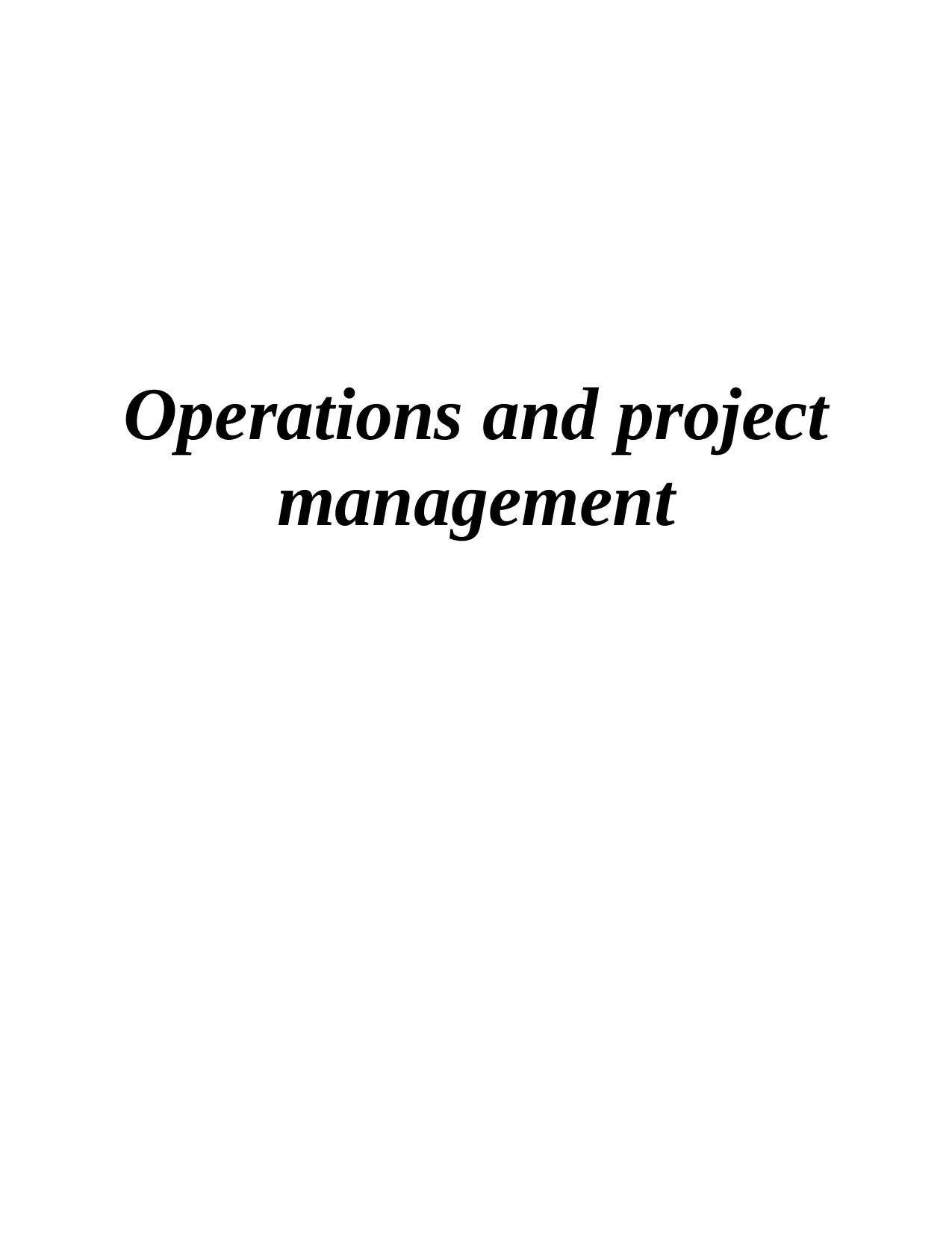
Operations and project
management
management
Paraphrase This Document
Need a fresh take? Get an instant paraphrase of this document with our AI Paraphraser
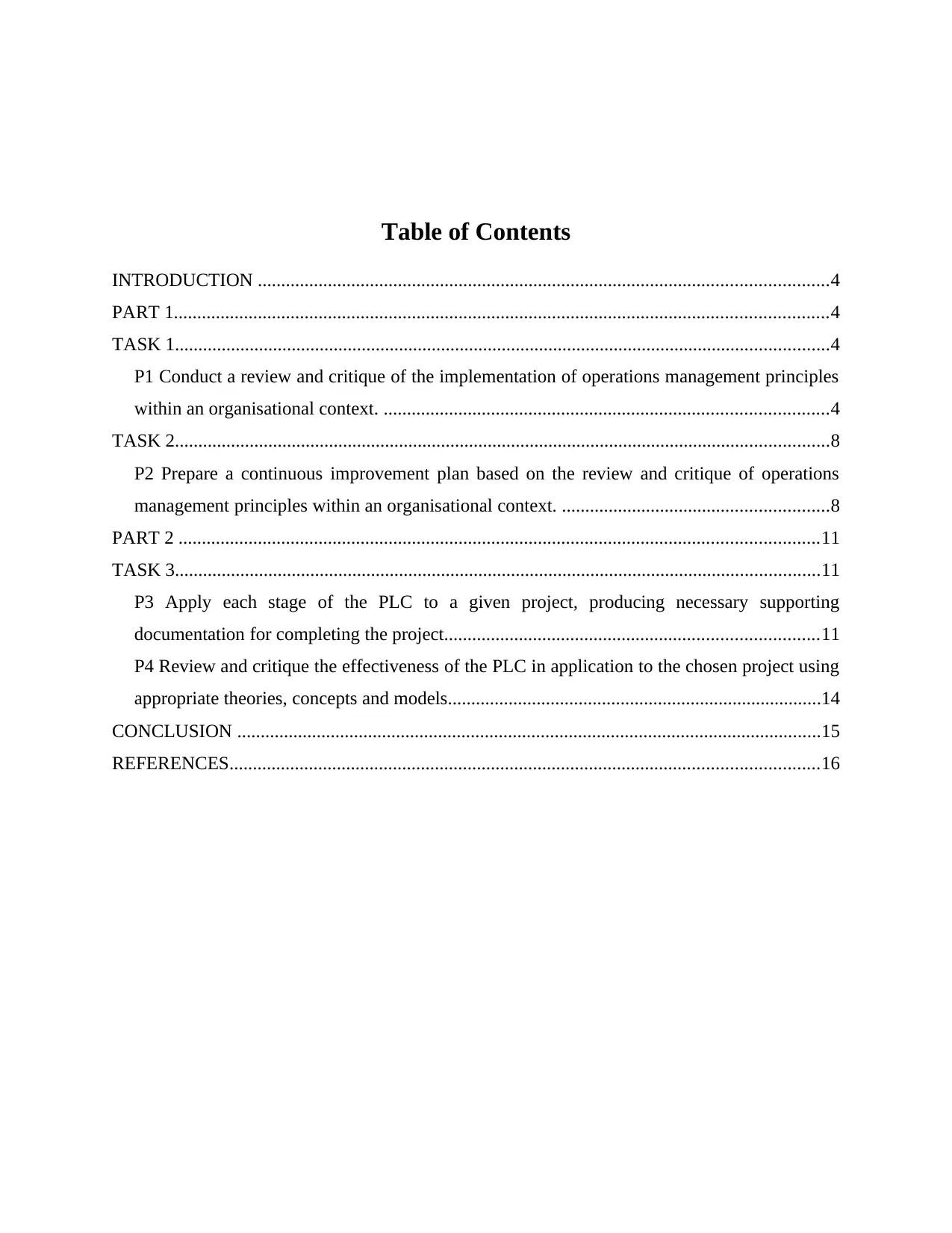
Table of Contents
INTRODUCTION ..........................................................................................................................4
PART 1............................................................................................................................................4
TASK 1............................................................................................................................................4
P1 Conduct a review and critique of the implementation of operations management principles
within an organisational context. ...............................................................................................4
TASK 2............................................................................................................................................8
P2 Prepare a continuous improvement plan based on the review and critique of operations
management principles within an organisational context. .........................................................8
PART 2 .........................................................................................................................................11
TASK 3..........................................................................................................................................11
P3 Apply each stage of the PLC to a given project, producing necessary supporting
documentation for completing the project................................................................................11
P4 Review and critique the effectiveness of the PLC in application to the chosen project using
appropriate theories, concepts and models................................................................................14
CONCLUSION .............................................................................................................................15
REFERENCES..............................................................................................................................16
INTRODUCTION ..........................................................................................................................4
PART 1............................................................................................................................................4
TASK 1............................................................................................................................................4
P1 Conduct a review and critique of the implementation of operations management principles
within an organisational context. ...............................................................................................4
TASK 2............................................................................................................................................8
P2 Prepare a continuous improvement plan based on the review and critique of operations
management principles within an organisational context. .........................................................8
PART 2 .........................................................................................................................................11
TASK 3..........................................................................................................................................11
P3 Apply each stage of the PLC to a given project, producing necessary supporting
documentation for completing the project................................................................................11
P4 Review and critique the effectiveness of the PLC in application to the chosen project using
appropriate theories, concepts and models................................................................................14
CONCLUSION .............................................................................................................................15
REFERENCES..............................................................................................................................16

⊘ This is a preview!⊘
Do you want full access?
Subscribe today to unlock all pages.

Trusted by 1+ million students worldwide
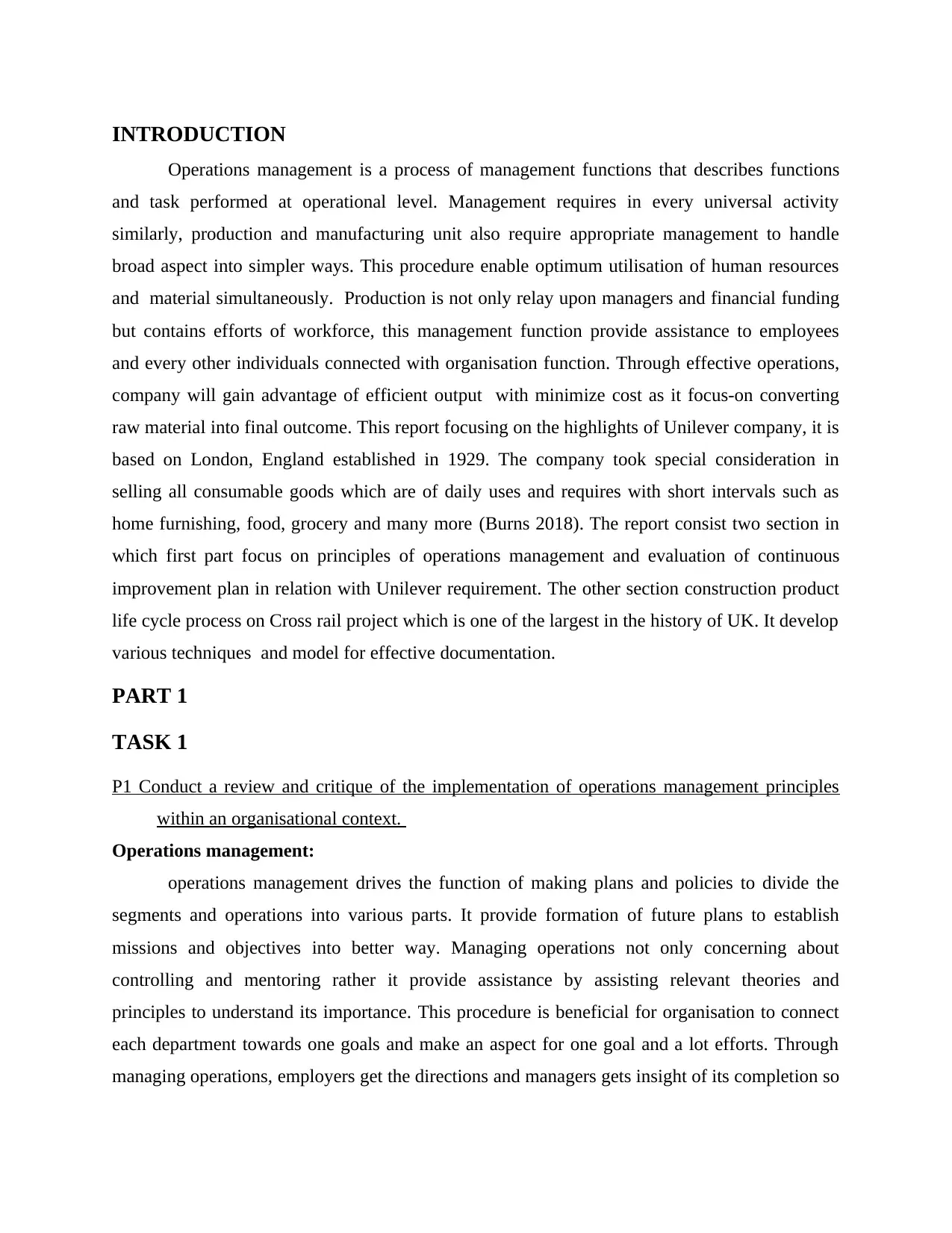
INTRODUCTION
Operations management is a process of management functions that describes functions
and task performed at operational level. Management requires in every universal activity
similarly, production and manufacturing unit also require appropriate management to handle
broad aspect into simpler ways. This procedure enable optimum utilisation of human resources
and material simultaneously. Production is not only relay upon managers and financial funding
but contains efforts of workforce, this management function provide assistance to employees
and every other individuals connected with organisation function. Through effective operations,
company will gain advantage of efficient output with minimize cost as it focus-on converting
raw material into final outcome. This report focusing on the highlights of Unilever company, it is
based on London, England established in 1929. The company took special consideration in
selling all consumable goods which are of daily uses and requires with short intervals such as
home furnishing, food, grocery and many more (Burns 2018). The report consist two section in
which first part focus on principles of operations management and evaluation of continuous
improvement plan in relation with Unilever requirement. The other section construction product
life cycle process on Cross rail project which is one of the largest in the history of UK. It develop
various techniques and model for effective documentation.
PART 1
TASK 1
P1 Conduct a review and critique of the implementation of operations management principles
within an organisational context.
Operations management:
operations management drives the function of making plans and policies to divide the
segments and operations into various parts. It provide formation of future plans to establish
missions and objectives into better way. Managing operations not only concerning about
controlling and mentoring rather it provide assistance by assisting relevant theories and
principles to understand its importance. This procedure is beneficial for organisation to connect
each department towards one goals and make an aspect for one goal and a lot efforts. Through
managing operations, employers get the directions and managers gets insight of its completion so
Operations management is a process of management functions that describes functions
and task performed at operational level. Management requires in every universal activity
similarly, production and manufacturing unit also require appropriate management to handle
broad aspect into simpler ways. This procedure enable optimum utilisation of human resources
and material simultaneously. Production is not only relay upon managers and financial funding
but contains efforts of workforce, this management function provide assistance to employees
and every other individuals connected with organisation function. Through effective operations,
company will gain advantage of efficient output with minimize cost as it focus-on converting
raw material into final outcome. This report focusing on the highlights of Unilever company, it is
based on London, England established in 1929. The company took special consideration in
selling all consumable goods which are of daily uses and requires with short intervals such as
home furnishing, food, grocery and many more (Burns 2018). The report consist two section in
which first part focus on principles of operations management and evaluation of continuous
improvement plan in relation with Unilever requirement. The other section construction product
life cycle process on Cross rail project which is one of the largest in the history of UK. It develop
various techniques and model for effective documentation.
PART 1
TASK 1
P1 Conduct a review and critique of the implementation of operations management principles
within an organisational context.
Operations management:
operations management drives the function of making plans and policies to divide the
segments and operations into various parts. It provide formation of future plans to establish
missions and objectives into better way. Managing operations not only concerning about
controlling and mentoring rather it provide assistance by assisting relevant theories and
principles to understand its importance. This procedure is beneficial for organisation to connect
each department towards one goals and make an aspect for one goal and a lot efforts. Through
managing operations, employers get the directions and managers gets insight of its completion so
Paraphrase This Document
Need a fresh take? Get an instant paraphrase of this document with our AI Paraphraser
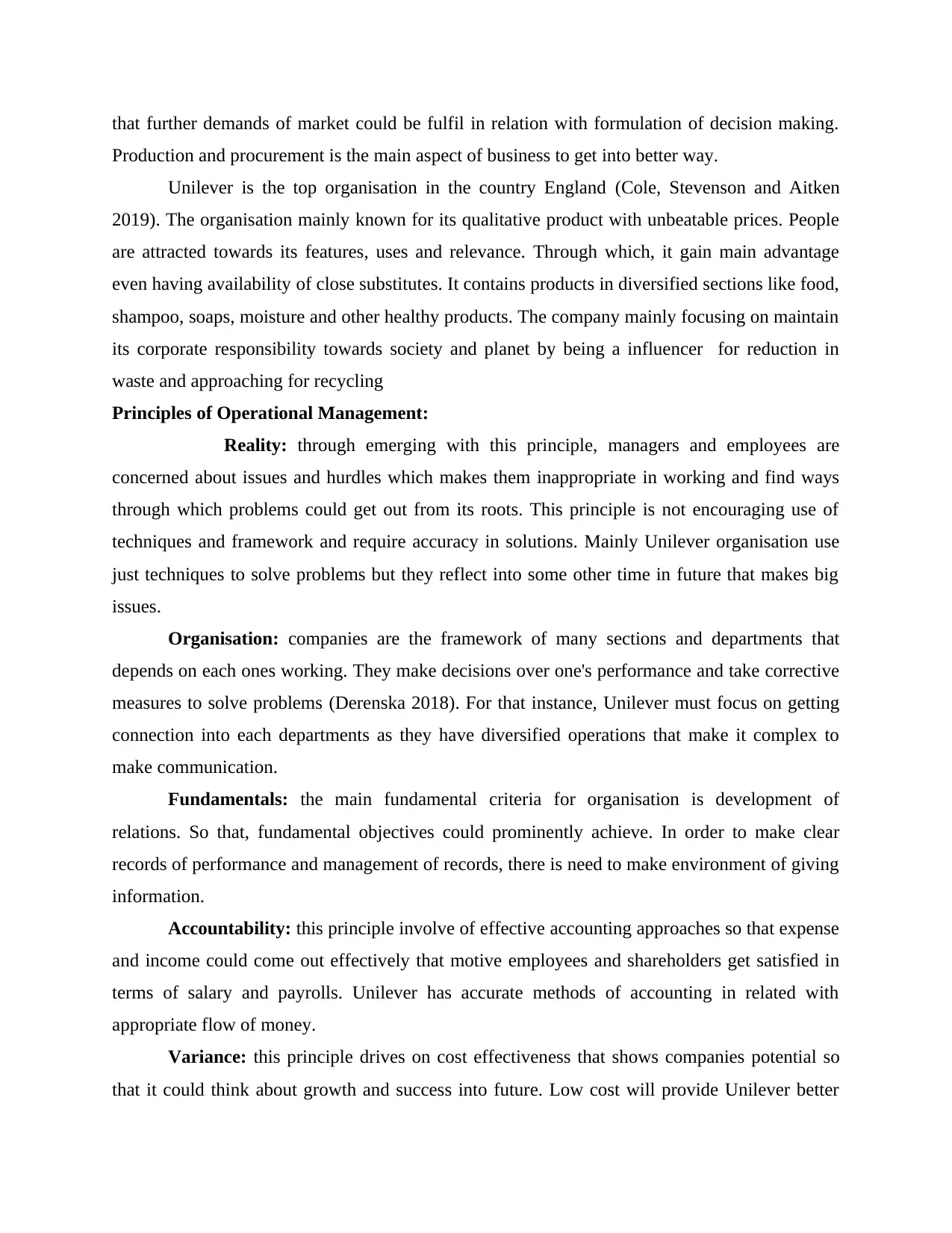
that further demands of market could be fulfil in relation with formulation of decision making.
Production and procurement is the main aspect of business to get into better way.
Unilever is the top organisation in the country England (Cole, Stevenson and Aitken
2019). The organisation mainly known for its qualitative product with unbeatable prices. People
are attracted towards its features, uses and relevance. Through which, it gain main advantage
even having availability of close substitutes. It contains products in diversified sections like food,
shampoo, soaps, moisture and other healthy products. The company mainly focusing on maintain
its corporate responsibility towards society and planet by being a influencer for reduction in
waste and approaching for recycling
Principles of Operational Management:
Reality: through emerging with this principle, managers and employees are
concerned about issues and hurdles which makes them inappropriate in working and find ways
through which problems could get out from its roots. This principle is not encouraging use of
techniques and framework and require accuracy in solutions. Mainly Unilever organisation use
just techniques to solve problems but they reflect into some other time in future that makes big
issues.
Organisation: companies are the framework of many sections and departments that
depends on each ones working. They make decisions over one's performance and take corrective
measures to solve problems (Derenska 2018). For that instance, Unilever must focus on getting
connection into each departments as they have diversified operations that make it complex to
make communication.
Fundamentals: the main fundamental criteria for organisation is development of
relations. So that, fundamental objectives could prominently achieve. In order to make clear
records of performance and management of records, there is need to make environment of giving
information.
Accountability: this principle involve of effective accounting approaches so that expense
and income could come out effectively that motive employees and shareholders get satisfied in
terms of salary and payrolls. Unilever has accurate methods of accounting in related with
appropriate flow of money.
Variance: this principle drives on cost effectiveness that shows companies potential so
that it could think about growth and success into future. Low cost will provide Unilever better
Production and procurement is the main aspect of business to get into better way.
Unilever is the top organisation in the country England (Cole, Stevenson and Aitken
2019). The organisation mainly known for its qualitative product with unbeatable prices. People
are attracted towards its features, uses and relevance. Through which, it gain main advantage
even having availability of close substitutes. It contains products in diversified sections like food,
shampoo, soaps, moisture and other healthy products. The company mainly focusing on maintain
its corporate responsibility towards society and planet by being a influencer for reduction in
waste and approaching for recycling
Principles of Operational Management:
Reality: through emerging with this principle, managers and employees are
concerned about issues and hurdles which makes them inappropriate in working and find ways
through which problems could get out from its roots. This principle is not encouraging use of
techniques and framework and require accuracy in solutions. Mainly Unilever organisation use
just techniques to solve problems but they reflect into some other time in future that makes big
issues.
Organisation: companies are the framework of many sections and departments that
depends on each ones working. They make decisions over one's performance and take corrective
measures to solve problems (Derenska 2018). For that instance, Unilever must focus on getting
connection into each departments as they have diversified operations that make it complex to
make communication.
Fundamentals: the main fundamental criteria for organisation is development of
relations. So that, fundamental objectives could prominently achieve. In order to make clear
records of performance and management of records, there is need to make environment of giving
information.
Accountability: this principle involve of effective accounting approaches so that expense
and income could come out effectively that motive employees and shareholders get satisfied in
terms of salary and payrolls. Unilever has accurate methods of accounting in related with
appropriate flow of money.
Variance: this principle drives on cost effectiveness that shows companies potential so
that it could think about growth and success into future. Low cost will provide Unilever better
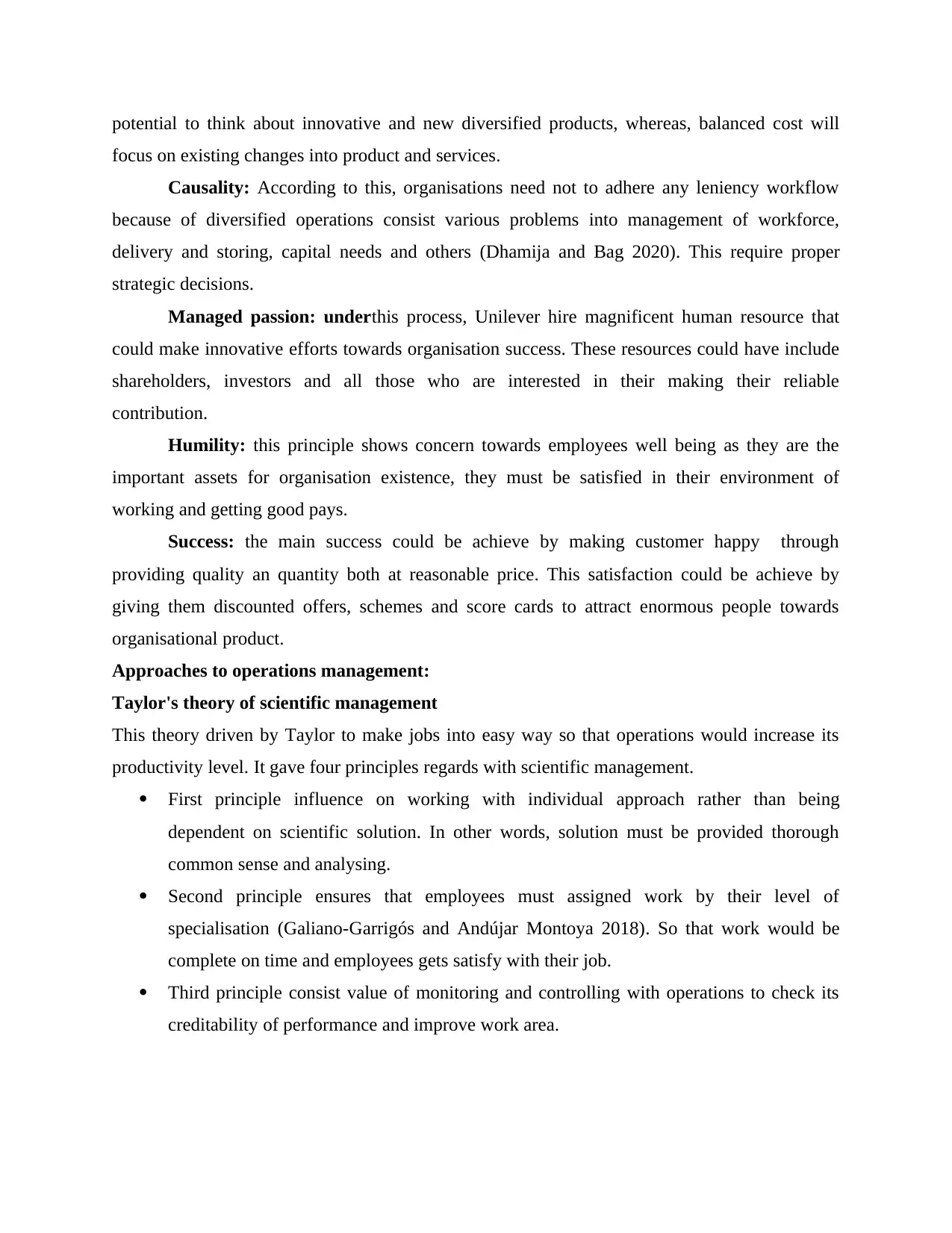
potential to think about innovative and new diversified products, whereas, balanced cost will
focus on existing changes into product and services.
Causality: According to this, organisations need not to adhere any leniency workflow
because of diversified operations consist various problems into management of workforce,
delivery and storing, capital needs and others (Dhamija and Bag 2020). This require proper
strategic decisions.
Managed passion: underthis process, Unilever hire magnificent human resource that
could make innovative efforts towards organisation success. These resources could have include
shareholders, investors and all those who are interested in their making their reliable
contribution.
Humility: this principle shows concern towards employees well being as they are the
important assets for organisation existence, they must be satisfied in their environment of
working and getting good pays.
Success: the main success could be achieve by making customer happy through
providing quality an quantity both at reasonable price. This satisfaction could be achieve by
giving them discounted offers, schemes and score cards to attract enormous people towards
organisational product.
Approaches to operations management:
Taylor's theory of scientific management
This theory driven by Taylor to make jobs into easy way so that operations would increase its
productivity level. It gave four principles regards with scientific management.
First principle influence on working with individual approach rather than being
dependent on scientific solution. In other words, solution must be provided thorough
common sense and analysing.
Second principle ensures that employees must assigned work by their level of
specialisation (Galiano-Garrigós and Andújar Montoya 2018). So that work would be
complete on time and employees gets satisfy with their job.
Third principle consist value of monitoring and controlling with operations to check its
creditability of performance and improve work area.
focus on existing changes into product and services.
Causality: According to this, organisations need not to adhere any leniency workflow
because of diversified operations consist various problems into management of workforce,
delivery and storing, capital needs and others (Dhamija and Bag 2020). This require proper
strategic decisions.
Managed passion: underthis process, Unilever hire magnificent human resource that
could make innovative efforts towards organisation success. These resources could have include
shareholders, investors and all those who are interested in their making their reliable
contribution.
Humility: this principle shows concern towards employees well being as they are the
important assets for organisation existence, they must be satisfied in their environment of
working and getting good pays.
Success: the main success could be achieve by making customer happy through
providing quality an quantity both at reasonable price. This satisfaction could be achieve by
giving them discounted offers, schemes and score cards to attract enormous people towards
organisational product.
Approaches to operations management:
Taylor's theory of scientific management
This theory driven by Taylor to make jobs into easy way so that operations would increase its
productivity level. It gave four principles regards with scientific management.
First principle influence on working with individual approach rather than being
dependent on scientific solution. In other words, solution must be provided thorough
common sense and analysing.
Second principle ensures that employees must assigned work by their level of
specialisation (Galiano-Garrigós and Andújar Montoya 2018). So that work would be
complete on time and employees gets satisfy with their job.
Third principle consist value of monitoring and controlling with operations to check its
creditability of performance and improve work area.
⊘ This is a preview!⊘
Do you want full access?
Subscribe today to unlock all pages.

Trusted by 1+ million students worldwide
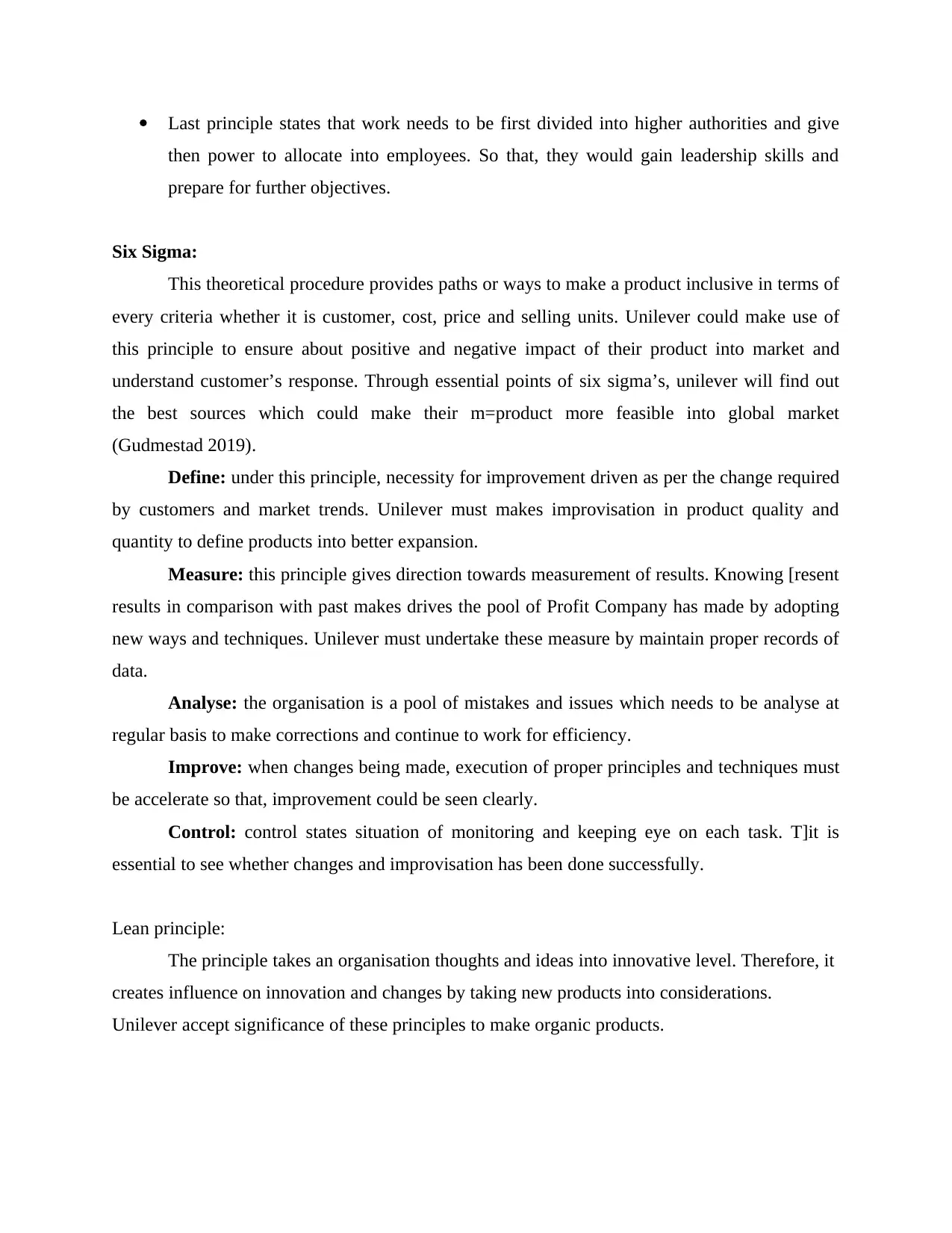
Last principle states that work needs to be first divided into higher authorities and give
then power to allocate into employees. So that, they would gain leadership skills and
prepare for further objectives.
Six Sigma:
This theoretical procedure provides paths or ways to make a product inclusive in terms of
every criteria whether it is customer, cost, price and selling units. Unilever could make use of
this principle to ensure about positive and negative impact of their product into market and
understand customer’s response. Through essential points of six sigma’s, unilever will find out
the best sources which could make their m=product more feasible into global market
(Gudmestad 2019).
Define: under this principle, necessity for improvement driven as per the change required
by customers and market trends. Unilever must makes improvisation in product quality and
quantity to define products into better expansion.
Measure: this principle gives direction towards measurement of results. Knowing [resent
results in comparison with past makes drives the pool of Profit Company has made by adopting
new ways and techniques. Unilever must undertake these measure by maintain proper records of
data.
Analyse: the organisation is a pool of mistakes and issues which needs to be analyse at
regular basis to make corrections and continue to work for efficiency.
Improve: when changes being made, execution of proper principles and techniques must
be accelerate so that, improvement could be seen clearly.
Control: control states situation of monitoring and keeping eye on each task. T]it is
essential to see whether changes and improvisation has been done successfully.
Lean principle:
The principle takes an organisation thoughts and ideas into innovative level. Therefore, it
creates influence on innovation and changes by taking new products into considerations.
Unilever accept significance of these principles to make organic products.
then power to allocate into employees. So that, they would gain leadership skills and
prepare for further objectives.
Six Sigma:
This theoretical procedure provides paths or ways to make a product inclusive in terms of
every criteria whether it is customer, cost, price and selling units. Unilever could make use of
this principle to ensure about positive and negative impact of their product into market and
understand customer’s response. Through essential points of six sigma’s, unilever will find out
the best sources which could make their m=product more feasible into global market
(Gudmestad 2019).
Define: under this principle, necessity for improvement driven as per the change required
by customers and market trends. Unilever must makes improvisation in product quality and
quantity to define products into better expansion.
Measure: this principle gives direction towards measurement of results. Knowing [resent
results in comparison with past makes drives the pool of Profit Company has made by adopting
new ways and techniques. Unilever must undertake these measure by maintain proper records of
data.
Analyse: the organisation is a pool of mistakes and issues which needs to be analyse at
regular basis to make corrections and continue to work for efficiency.
Improve: when changes being made, execution of proper principles and techniques must
be accelerate so that, improvement could be seen clearly.
Control: control states situation of monitoring and keeping eye on each task. T]it is
essential to see whether changes and improvisation has been done successfully.
Lean principle:
The principle takes an organisation thoughts and ideas into innovative level. Therefore, it
creates influence on innovation and changes by taking new products into considerations.
Unilever accept significance of these principles to make organic products.
Paraphrase This Document
Need a fresh take? Get an instant paraphrase of this document with our AI Paraphraser
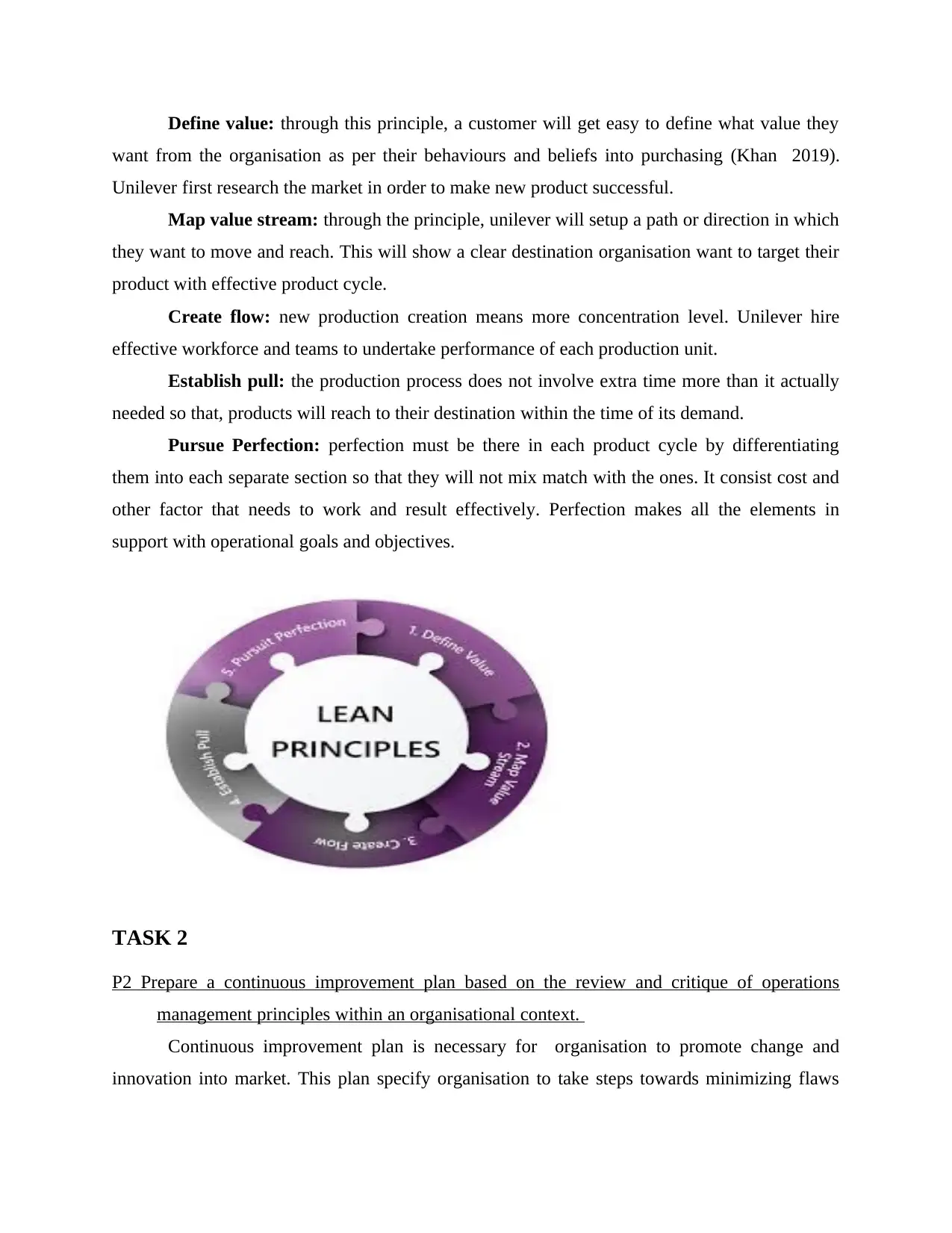
Define value: through this principle, a customer will get easy to define what value they
want from the organisation as per their behaviours and beliefs into purchasing (Khan 2019).
Unilever first research the market in order to make new product successful.
Map value stream: through the principle, unilever will setup a path or direction in which
they want to move and reach. This will show a clear destination organisation want to target their
product with effective product cycle.
Create flow: new production creation means more concentration level. Unilever hire
effective workforce and teams to undertake performance of each production unit.
Establish pull: the production process does not involve extra time more than it actually
needed so that, products will reach to their destination within the time of its demand.
Pursue Perfection: perfection must be there in each product cycle by differentiating
them into each separate section so that they will not mix match with the ones. It consist cost and
other factor that needs to work and result effectively. Perfection makes all the elements in
support with operational goals and objectives.
TASK 2
P2 Prepare a continuous improvement plan based on the review and critique of operations
management principles within an organisational context.
Continuous improvement plan is necessary for organisation to promote change and
innovation into market. This plan specify organisation to take steps towards minimizing flaws
want from the organisation as per their behaviours and beliefs into purchasing (Khan 2019).
Unilever first research the market in order to make new product successful.
Map value stream: through the principle, unilever will setup a path or direction in which
they want to move and reach. This will show a clear destination organisation want to target their
product with effective product cycle.
Create flow: new production creation means more concentration level. Unilever hire
effective workforce and teams to undertake performance of each production unit.
Establish pull: the production process does not involve extra time more than it actually
needed so that, products will reach to their destination within the time of its demand.
Pursue Perfection: perfection must be there in each product cycle by differentiating
them into each separate section so that they will not mix match with the ones. It consist cost and
other factor that needs to work and result effectively. Perfection makes all the elements in
support with operational goals and objectives.
TASK 2
P2 Prepare a continuous improvement plan based on the review and critique of operations
management principles within an organisational context.
Continuous improvement plan is necessary for organisation to promote change and
innovation into market. This plan specify organisation to take steps towards minimizing flaws
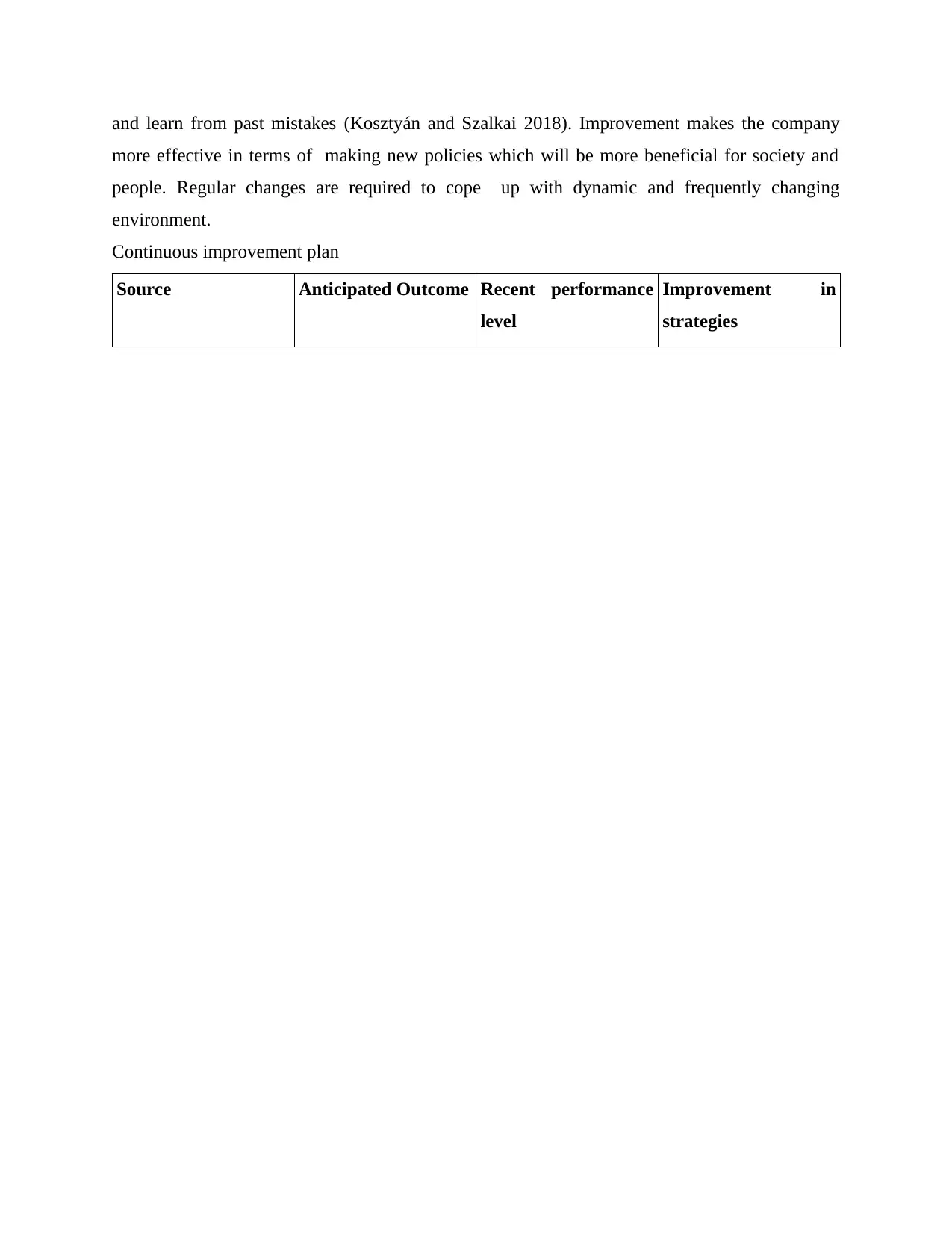
and learn from past mistakes (Kosztyán and Szalkai 2018). Improvement makes the company
more effective in terms of making new policies which will be more beneficial for society and
people. Regular changes are required to cope up with dynamic and frequently changing
environment.
Continuous improvement plan
Source Anticipated Outcome Recent performance
level
Improvement in
strategies
more effective in terms of making new policies which will be more beneficial for society and
people. Regular changes are required to cope up with dynamic and frequently changing
environment.
Continuous improvement plan
Source Anticipated Outcome Recent performance
level
Improvement in
strategies
⊘ This is a preview!⊘
Do you want full access?
Subscribe today to unlock all pages.

Trusted by 1+ million students worldwide
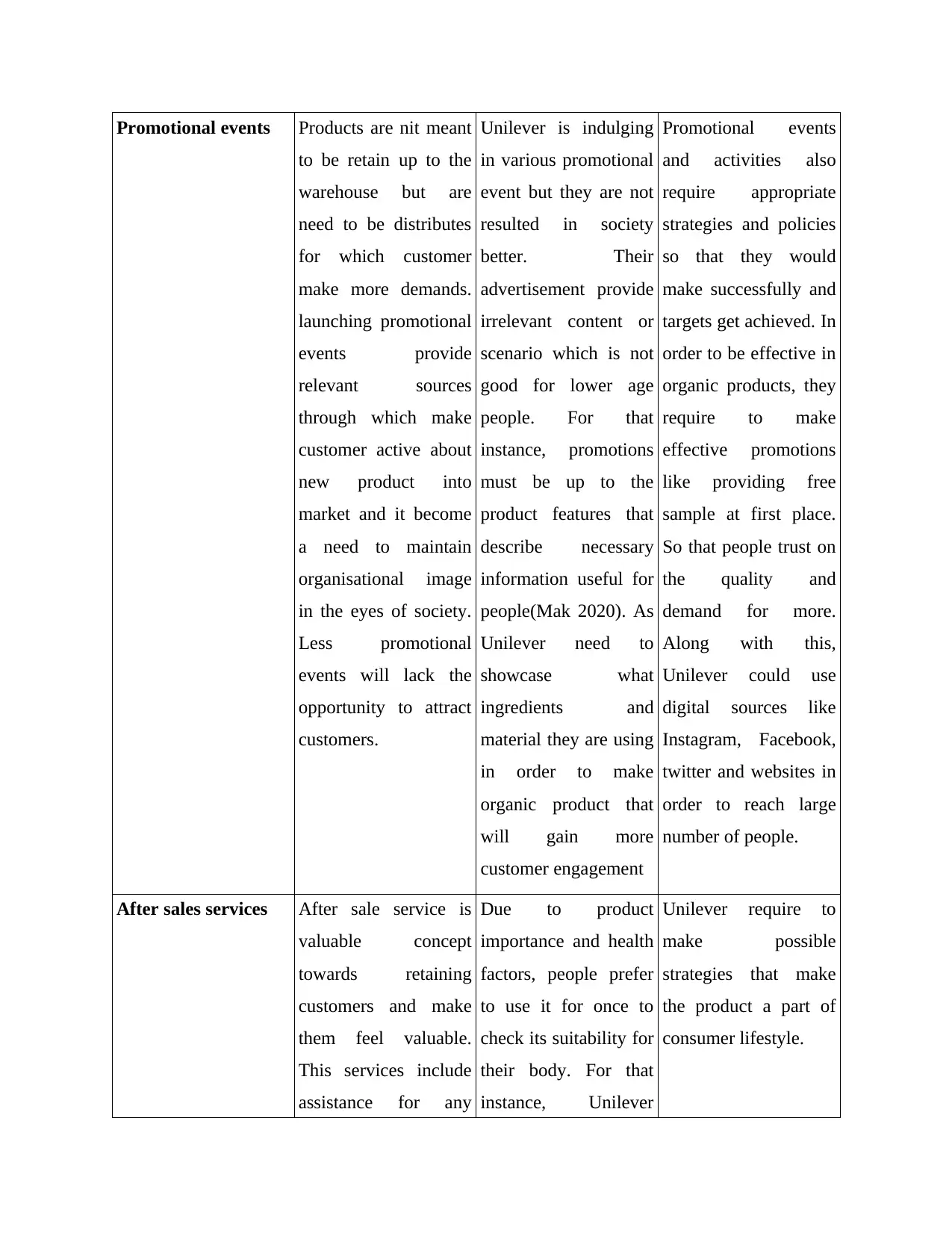
Promotional events Products are nit meant
to be retain up to the
warehouse but are
need to be distributes
for which customer
make more demands.
launching promotional
events provide
relevant sources
through which make
customer active about
new product into
market and it become
a need to maintain
organisational image
in the eyes of society.
Less promotional
events will lack the
opportunity to attract
customers.
Unilever is indulging
in various promotional
event but they are not
resulted in society
better. Their
advertisement provide
irrelevant content or
scenario which is not
good for lower age
people. For that
instance, promotions
must be up to the
product features that
describe necessary
information useful for
people(Mak 2020). As
Unilever need to
showcase what
ingredients and
material they are using
in order to make
organic product that
will gain more
customer engagement
Promotional events
and activities also
require appropriate
strategies and policies
so that they would
make successfully and
targets get achieved. In
order to be effective in
organic products, they
require to make
effective promotions
like providing free
sample at first place.
So that people trust on
the quality and
demand for more.
Along with this,
Unilever could use
digital sources like
Instagram, Facebook,
twitter and websites in
order to reach large
number of people.
After sales services After sale service is
valuable concept
towards retaining
customers and make
them feel valuable.
This services include
assistance for any
Due to product
importance and health
factors, people prefer
to use it for once to
check its suitability for
their body. For that
instance, Unilever
Unilever require to
make possible
strategies that make
the product a part of
consumer lifestyle.
to be retain up to the
warehouse but are
need to be distributes
for which customer
make more demands.
launching promotional
events provide
relevant sources
through which make
customer active about
new product into
market and it become
a need to maintain
organisational image
in the eyes of society.
Less promotional
events will lack the
opportunity to attract
customers.
Unilever is indulging
in various promotional
event but they are not
resulted in society
better. Their
advertisement provide
irrelevant content or
scenario which is not
good for lower age
people. For that
instance, promotions
must be up to the
product features that
describe necessary
information useful for
people(Mak 2020). As
Unilever need to
showcase what
ingredients and
material they are using
in order to make
organic product that
will gain more
customer engagement
Promotional events
and activities also
require appropriate
strategies and policies
so that they would
make successfully and
targets get achieved. In
order to be effective in
organic products, they
require to make
effective promotions
like providing free
sample at first place.
So that people trust on
the quality and
demand for more.
Along with this,
Unilever could use
digital sources like
Instagram, Facebook,
twitter and websites in
order to reach large
number of people.
After sales services After sale service is
valuable concept
towards retaining
customers and make
them feel valuable.
This services include
assistance for any
Due to product
importance and health
factors, people prefer
to use it for once to
check its suitability for
their body. For that
instance, Unilever
Unilever require to
make possible
strategies that make
the product a part of
consumer lifestyle.
Paraphrase This Document
Need a fresh take? Get an instant paraphrase of this document with our AI Paraphraser
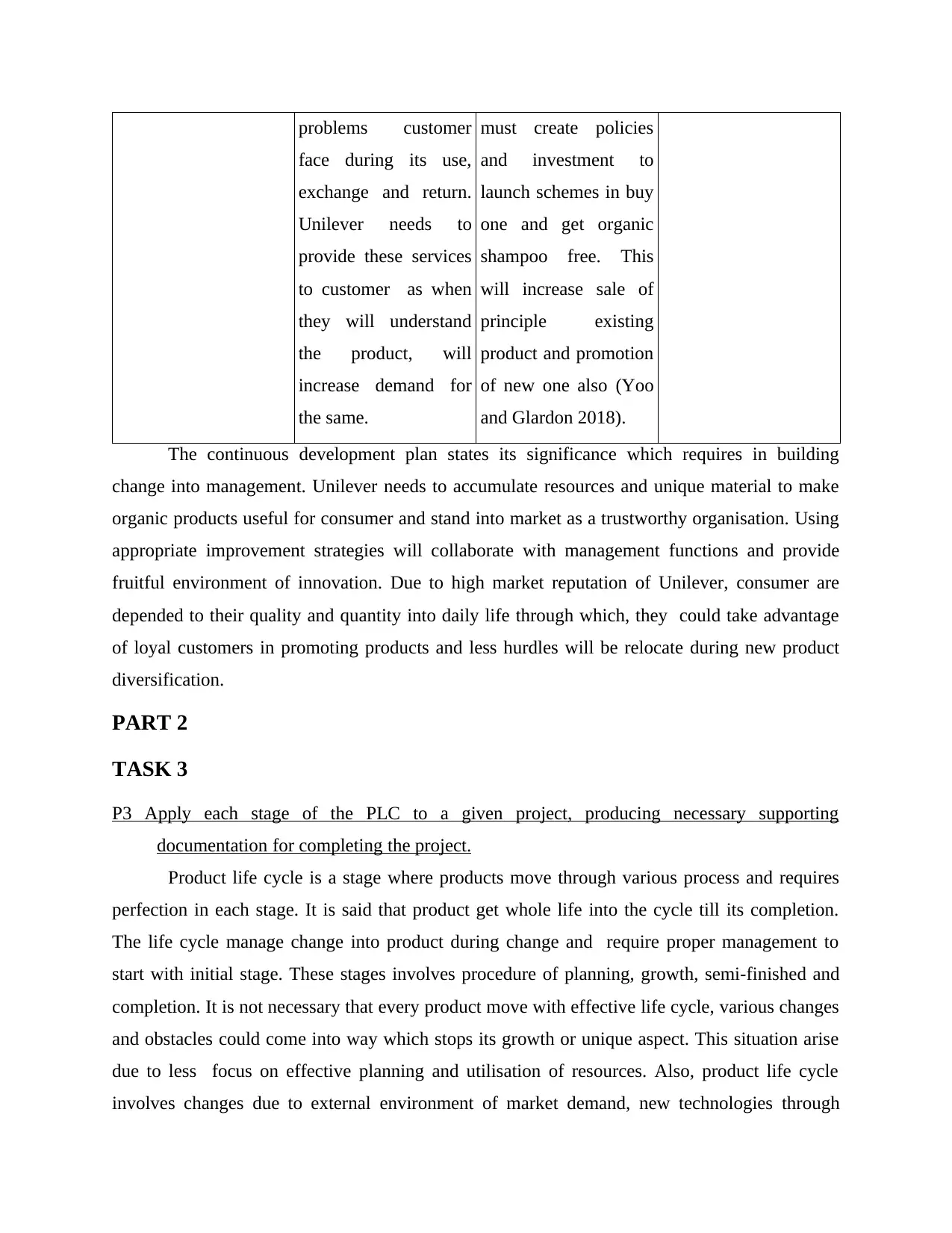
problems customer
face during its use,
exchange and return.
Unilever needs to
provide these services
to customer as when
they will understand
the product, will
increase demand for
the same.
must create policies
and investment to
launch schemes in buy
one and get organic
shampoo free. This
will increase sale of
principle existing
product and promotion
of new one also (Yoo
and Glardon 2018).
The continuous development plan states its significance which requires in building
change into management. Unilever needs to accumulate resources and unique material to make
organic products useful for consumer and stand into market as a trustworthy organisation. Using
appropriate improvement strategies will collaborate with management functions and provide
fruitful environment of innovation. Due to high market reputation of Unilever, consumer are
depended to their quality and quantity into daily life through which, they could take advantage
of loyal customers in promoting products and less hurdles will be relocate during new product
diversification.
PART 2
TASK 3
P3 Apply each stage of the PLC to a given project, producing necessary supporting
documentation for completing the project.
Product life cycle is a stage where products move through various process and requires
perfection in each stage. It is said that product get whole life into the cycle till its completion.
The life cycle manage change into product during change and require proper management to
start with initial stage. These stages involves procedure of planning, growth, semi-finished and
completion. It is not necessary that every product move with effective life cycle, various changes
and obstacles could come into way which stops its growth or unique aspect. This situation arise
due to less focus on effective planning and utilisation of resources. Also, product life cycle
involves changes due to external environment of market demand, new technologies through
face during its use,
exchange and return.
Unilever needs to
provide these services
to customer as when
they will understand
the product, will
increase demand for
the same.
must create policies
and investment to
launch schemes in buy
one and get organic
shampoo free. This
will increase sale of
principle existing
product and promotion
of new one also (Yoo
and Glardon 2018).
The continuous development plan states its significance which requires in building
change into management. Unilever needs to accumulate resources and unique material to make
organic products useful for consumer and stand into market as a trustworthy organisation. Using
appropriate improvement strategies will collaborate with management functions and provide
fruitful environment of innovation. Due to high market reputation of Unilever, consumer are
depended to their quality and quantity into daily life through which, they could take advantage
of loyal customers in promoting products and less hurdles will be relocate during new product
diversification.
PART 2
TASK 3
P3 Apply each stage of the PLC to a given project, producing necessary supporting
documentation for completing the project.
Product life cycle is a stage where products move through various process and requires
perfection in each stage. It is said that product get whole life into the cycle till its completion.
The life cycle manage change into product during change and require proper management to
start with initial stage. These stages involves procedure of planning, growth, semi-finished and
completion. It is not necessary that every product move with effective life cycle, various changes
and obstacles could come into way which stops its growth or unique aspect. This situation arise
due to less focus on effective planning and utilisation of resources. Also, product life cycle
involves changes due to external environment of market demand, new technologies through
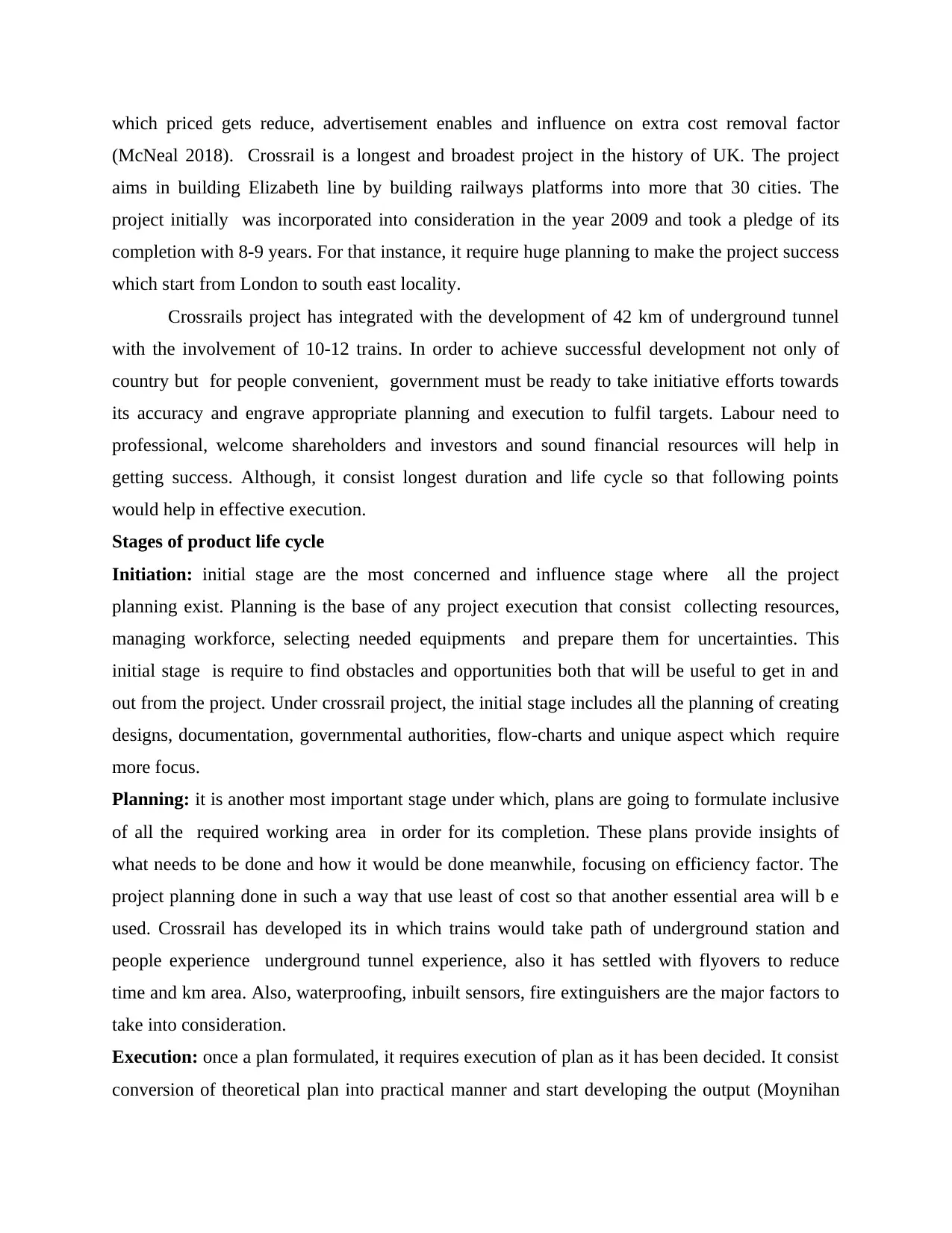
which priced gets reduce, advertisement enables and influence on extra cost removal factor
(McNeal 2018). Crossrail is a longest and broadest project in the history of UK. The project
aims in building Elizabeth line by building railways platforms into more that 30 cities. The
project initially was incorporated into consideration in the year 2009 and took a pledge of its
completion with 8-9 years. For that instance, it require huge planning to make the project success
which start from London to south east locality.
Crossrails project has integrated with the development of 42 km of underground tunnel
with the involvement of 10-12 trains. In order to achieve successful development not only of
country but for people convenient, government must be ready to take initiative efforts towards
its accuracy and engrave appropriate planning and execution to fulfil targets. Labour need to
professional, welcome shareholders and investors and sound financial resources will help in
getting success. Although, it consist longest duration and life cycle so that following points
would help in effective execution.
Stages of product life cycle
Initiation: initial stage are the most concerned and influence stage where all the project
planning exist. Planning is the base of any project execution that consist collecting resources,
managing workforce, selecting needed equipments and prepare them for uncertainties. This
initial stage is require to find obstacles and opportunities both that will be useful to get in and
out from the project. Under crossrail project, the initial stage includes all the planning of creating
designs, documentation, governmental authorities, flow-charts and unique aspect which require
more focus.
Planning: it is another most important stage under which, plans are going to formulate inclusive
of all the required working area in order for its completion. These plans provide insights of
what needs to be done and how it would be done meanwhile, focusing on efficiency factor. The
project planning done in such a way that use least of cost so that another essential area will b e
used. Crossrail has developed its in which trains would take path of underground station and
people experience underground tunnel experience, also it has settled with flyovers to reduce
time and km area. Also, waterproofing, inbuilt sensors, fire extinguishers are the major factors to
take into consideration.
Execution: once a plan formulated, it requires execution of plan as it has been decided. It consist
conversion of theoretical plan into practical manner and start developing the output (Moynihan
(McNeal 2018). Crossrail is a longest and broadest project in the history of UK. The project
aims in building Elizabeth line by building railways platforms into more that 30 cities. The
project initially was incorporated into consideration in the year 2009 and took a pledge of its
completion with 8-9 years. For that instance, it require huge planning to make the project success
which start from London to south east locality.
Crossrails project has integrated with the development of 42 km of underground tunnel
with the involvement of 10-12 trains. In order to achieve successful development not only of
country but for people convenient, government must be ready to take initiative efforts towards
its accuracy and engrave appropriate planning and execution to fulfil targets. Labour need to
professional, welcome shareholders and investors and sound financial resources will help in
getting success. Although, it consist longest duration and life cycle so that following points
would help in effective execution.
Stages of product life cycle
Initiation: initial stage are the most concerned and influence stage where all the project
planning exist. Planning is the base of any project execution that consist collecting resources,
managing workforce, selecting needed equipments and prepare them for uncertainties. This
initial stage is require to find obstacles and opportunities both that will be useful to get in and
out from the project. Under crossrail project, the initial stage includes all the planning of creating
designs, documentation, governmental authorities, flow-charts and unique aspect which require
more focus.
Planning: it is another most important stage under which, plans are going to formulate inclusive
of all the required working area in order for its completion. These plans provide insights of
what needs to be done and how it would be done meanwhile, focusing on efficiency factor. The
project planning done in such a way that use least of cost so that another essential area will b e
used. Crossrail has developed its in which trains would take path of underground station and
people experience underground tunnel experience, also it has settled with flyovers to reduce
time and km area. Also, waterproofing, inbuilt sensors, fire extinguishers are the major factors to
take into consideration.
Execution: once a plan formulated, it requires execution of plan as it has been decided. It consist
conversion of theoretical plan into practical manner and start developing the output (Moynihan
⊘ This is a preview!⊘
Do you want full access?
Subscribe today to unlock all pages.

Trusted by 1+ million students worldwide
1 out of 18
Related Documents
Your All-in-One AI-Powered Toolkit for Academic Success.
+13062052269
info@desklib.com
Available 24*7 on WhatsApp / Email
![[object Object]](/_next/static/media/star-bottom.7253800d.svg)
Unlock your academic potential
Copyright © 2020–2026 A2Z Services. All Rights Reserved. Developed and managed by ZUCOL.





